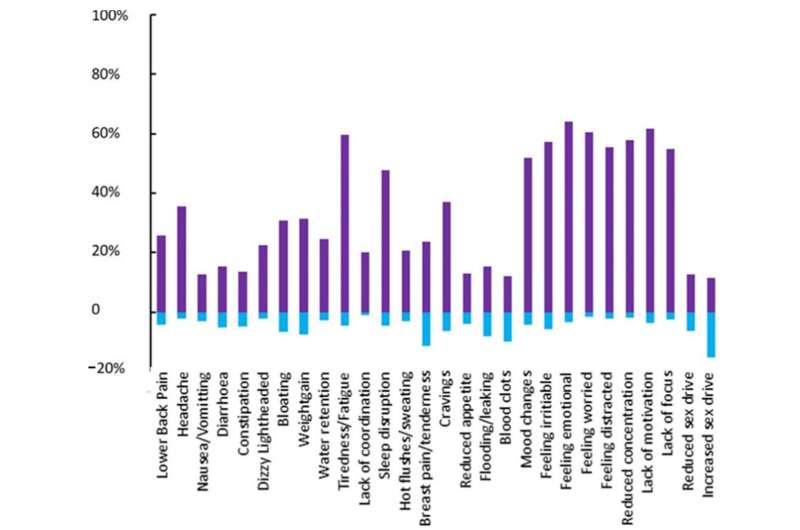Women's menstrual cycles impacted by pandemic lockdowns, research suggests

Scientists at Nottingham Trent University investigated menstrual cycle characteristics of more than 550 women before and during lockdown.
In 2020 the pandemic resulted in significant disruption to daily life for people across the world, with significant changes to work, social, dietary and exercise patterns.
The researchers found that half (50%) of women reported a change in cycle length during lockdown and more than two-thirds (71%) experienced a change in bleeding patterns.
The menstrual cycle can be altered by a wide range of factors and the researchers say it is important that females and clinicians understand these changes and whether there might be any possible effects on women's health at an individual level.
Participants reported a median increase in their cycle length of five days and a median decrease of three days once lockdown began and a third of women (34%) said they saw an increase in at least one symptom related to their typical cycle.
The researchers sought to identify the main contributing factors brought about by changes in diet, exercise and stress.
Participants reported an increased alcohol intake, consumption of cooked and baked goods and unhealthy foods.
The researchers found changes in menstrual cycle length—both an increase and decrease—were significantly associated with eating white and processed meats and an increase in dairy consumption was associated with cycle length increase.
Most menstrual cycle-associated symptoms that showed evidence of change from the onset of the pandemic into the lockdown were psychosocial in nature.
More than half of all participants reported a change in mood (54%) irritability (60%) emotional feeling (67%) worry (61%) feeling distracted (57%) lack of concentration (57%) motivation (62%) and focus (56%).
Despite numerous changes in symptoms of the menstrual cycle, a lack of focus was the only one significantly associated with a change in cycle length, where it was found to have increased in almost two-thirds (61%) of women.
Surprisingly, stress—known to elicit changes in the menstrual cycle—was not associated with a greater likelihood of a change in cycle length, the researchers reported, despite more than half of participants reporting high stress in relation to worry about their families' health.
The study suggests that this finding could be due to the fact that a large proportion of women were exercising females, exercise and balanced nutrition are recommended actions to offset stress.
Despite this, researchers say that longer-term stress could still have a negative impact on fertility and reproductive health.
The team found some differences in symptoms between women of differing activity levels. Generally, active women showed a change in cycle length to be associated with a lack of focus, whilst for elite active level women, lower back pain and a lack of motivation were linked to cycle length change.
"While more research needs to be done in relation to potential factors driving changes, our initial findings provide a small but useful insight into the impact of lifestyle changes on women's menstrual cycle patterns and symptoms during the first pandemic lockdown," said lead researcher Dr. Jessica Piasecki, an expert in exercise physiology in Nottingham Trent University's School of Science and Technology.
She said, "With the ongoing uncertainty of COVID-19 and peaks and troughs on the number of cases, there are concerns that continued cycle changes over time could become a serious consequence perhaps contributing to longer term reproductive issues, but further research is needed.
"Links between lockdown and mental health mean it's unsurprising that the most substantial changes were in psychosocial symptoms and again our work highlights the potential for long-term stress to influence female fertility and other health.
"Future research should continue to investigate any long-lasting changes, as well as providing education and support for females undergoing any life stressors that may implicate their menstrual cycle or its symptoms."
The study—which also involved University College London, Loughborough University, the University of Lincoln and sports science organization Orreco Ltd—is published in the International Journal of Environmental Research and Public Health.
More information: Georgie Bruinvels et al, How Lifestyle Changes during the COVID-19 Global Pandemic Affected the Pattern and Symptoms of the Menstrual Cycle, International Journal of Environmental Research and Public Health (2022). DOI: 10.3390/ijerph192013622





















